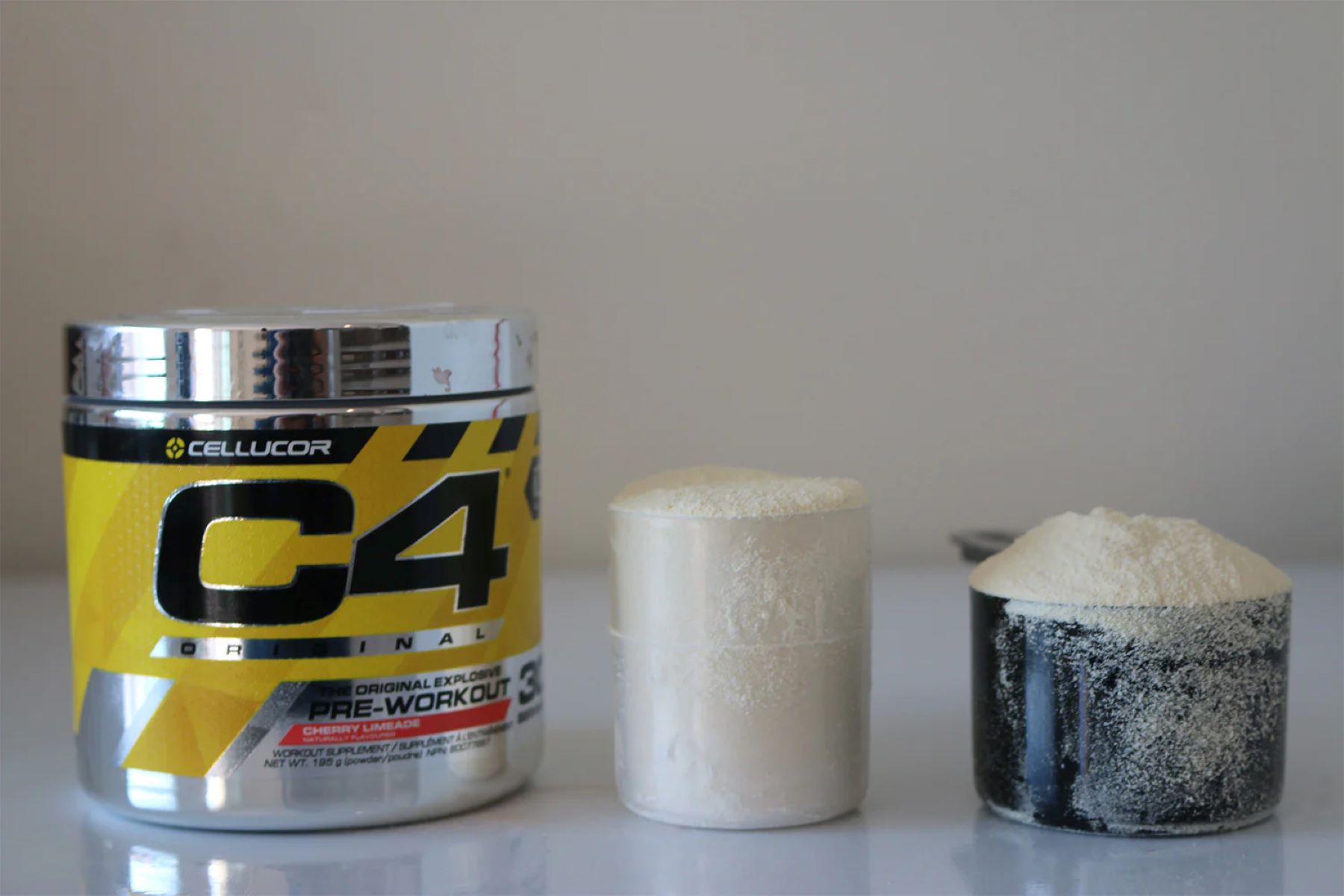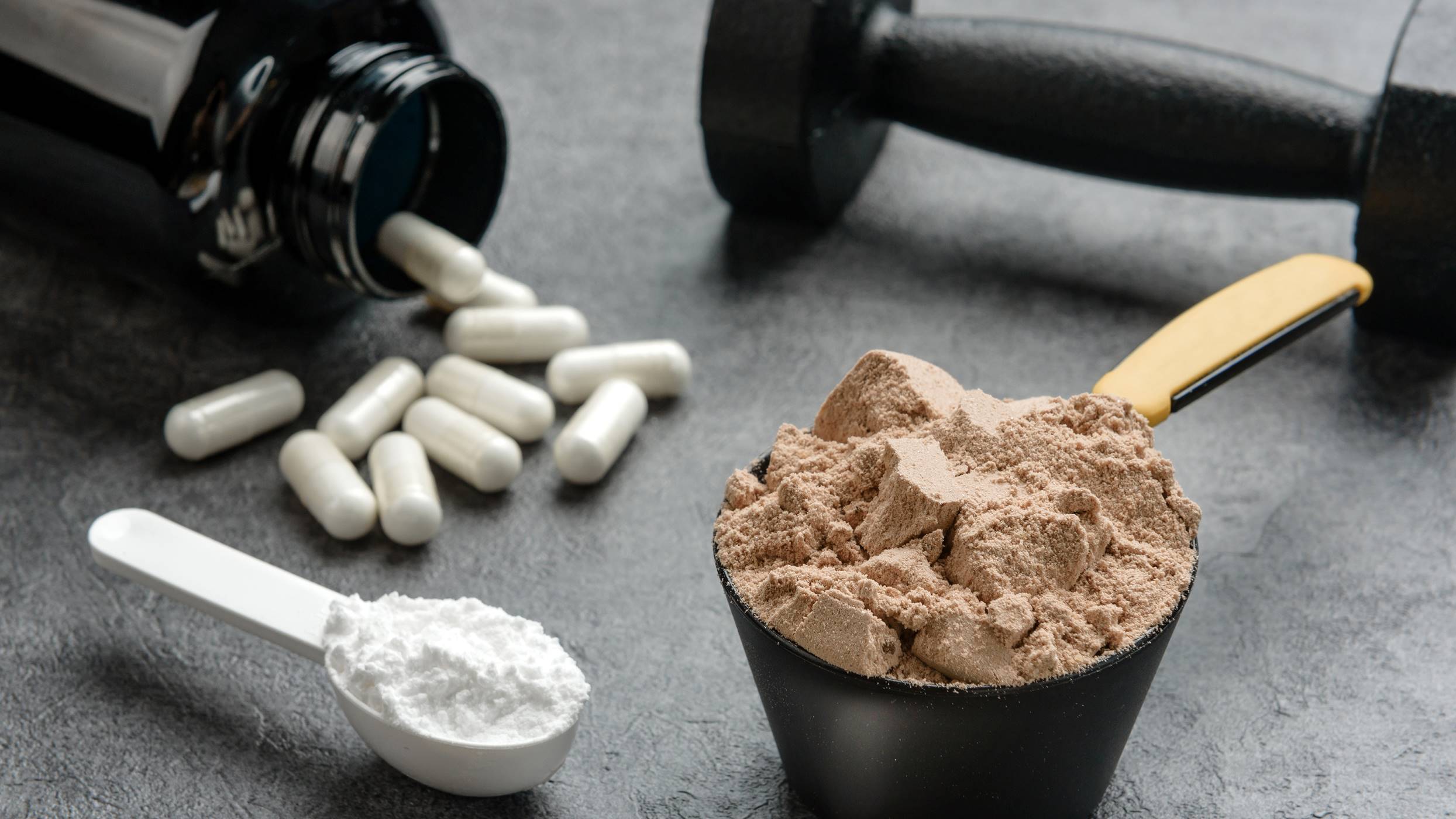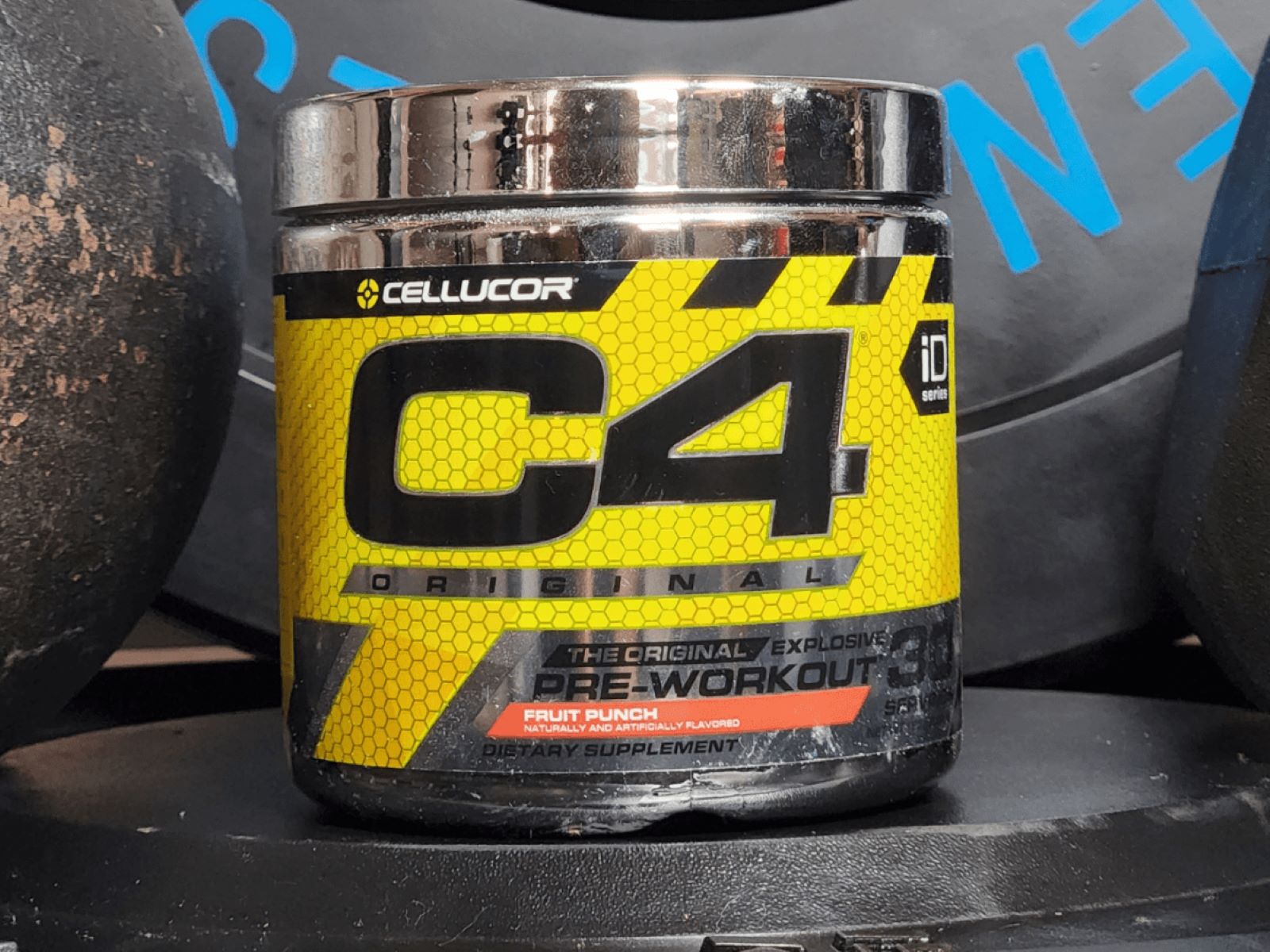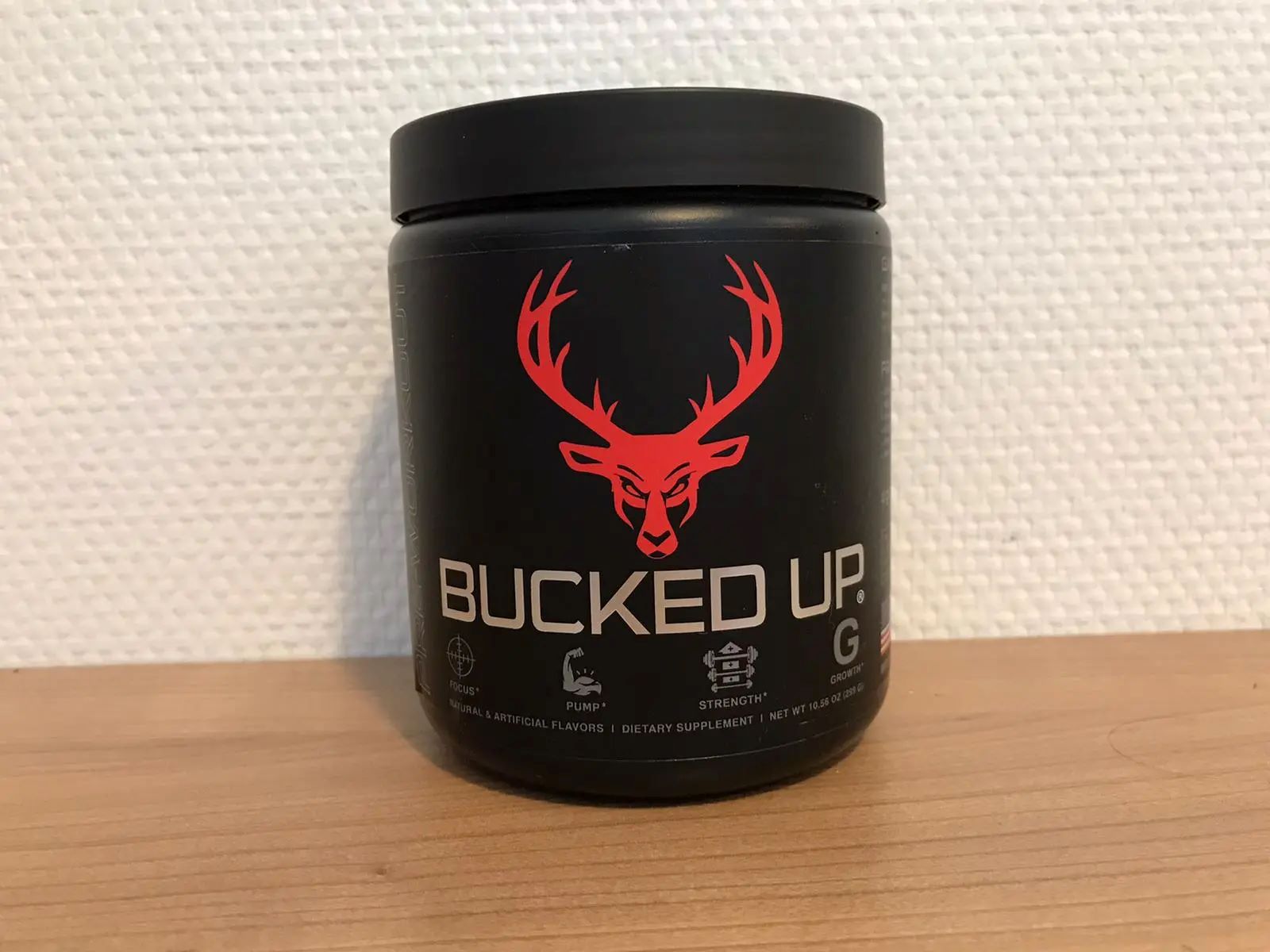

Featured
How Much Caffeine Is In Pre-Workout
Modified: January 2, 2024
Discover the amount of caffeine in various pre-workout supplements and find out which ones are featured as top choices for your fitness routine.
Introduction
When it comes to getting the most out of your workouts, many fitness enthusiasts turn to pre-workout supplements for an extra boost of energy and performance enhancement. These supplements often contain a variety of ingredients, including caffeine, to help you push through your workouts with intensity and focus.
Pre-workout supplements have gained popularity among athletes and gym-goers for their ability to increase energy levels, improve endurance, and enhance overall performance. They are designed to provide the body with the necessary nutrients and stimulants to maximize workout potential and achieve optimal results.
While there are many different pre-workout supplements available on the market, one ingredient that is commonly found in these products is caffeine. Caffeine is a natural stimulant that acts on the central nervous system, promoting alertness, reducing fatigue, and improving cognitive function.
In this article, we will explore the role of caffeine in pre-workout supplements, discussing its benefits, recommended dosage, and potential side effects. We will also touch upon the factors that can affect the caffeine content in these supplements and provide tips on choosing the right pre-workout supplement for your fitness goals.
Whether you’re a seasoned athlete or just starting your fitness journey, understanding the role of caffeine in pre-workout supplements can help you make informed decisions about your pre-workout routine and optimize your performance at the gym.
What is Pre-Workout?
Pre-workout refers to the supplements that are taken before a workout session to enhance performance, energy levels, and focus. These supplements are specifically formulated with a combination of ingredients that work synergistically to provide various benefits during exercise.
The primary purpose of pre-workout supplements is to improve athletic performance and optimize the results of your workout. They are designed to increase energy, enhance endurance, promote muscle strength, and improve mental focus and concentration.
Pre-workout supplements typically come in powder or pill form and are often mixed with water or other liquids for consumption. They contain a blend of ingredients carefully selected to maximize effectiveness, including stimulants, amino acids, vitamins, and minerals.
Stimulants such as caffeine are commonly found in pre-workout supplements. These substances help to increase alertness, reduce fatigue, and provide an energy boost, allowing individuals to train harder and for longer periods.
Amino acids, such as beta-alanine and L-arginine, are also frequently included in pre-workout formulas. These amino acids help support muscle recovery, increase muscle endurance, and promote muscle growth.
Pre-workout supplements may also contain vitamins and minerals like B vitamins, creatine, and nitric oxide boosters. B vitamins play a crucial role in energy production, while creatine enhances strength and power. Nitric oxide boosters help to improve blood flow and nutrient delivery to the muscles during exercise.
Overall, pre-workout supplements are designed to provide a synergistic blend of ingredients that work together to improve athletic performance, increase energy levels, and enhance mental focus and concentration during workouts. By taking a pre-workout supplement, individuals can experience greater motivation, intensity, and endurance, allowing them to push through their workouts and achieve better results.
Benefits of Pre-Workout Supplements
Pre-workout supplements offer a range of benefits that can enhance your workout performance and help you achieve your fitness goals. Here are some of the key benefits of incorporating pre-workout supplements into your fitness routine:
1. Increased Energy: One of the primary benefits of pre-workout supplements is their ability to provide a significant energy boost. Ingredients like caffeine and other stimulants can increase alertness and combat fatigue, allowing you to train at a higher intensity for longer durations.
2. Improved Endurance: Pre-workout supplements often contain ingredients like beta-alanine and citrulline malate, which are known to enhance muscular endurance. These nutrients can reduce the onset of fatigue, allowing you to perform more reps and prolong your workout without feeling as tired.
3. Enhanced Strength and Power: Certain pre-workout supplements contain creatine, a compound that can increase strength and power output. By supplementing with creatine before your workout, you may experience improved muscular strength, enabling you to lift heavier weights and perform more challenging exercises.
4. Increased Focus and Concentration: Many pre-workout supplements include ingredients like tyrosine and L-theanine, which can enhance mental focus and concentration. These substances help you stay in the zone during your training sessions, ultimately improving your mind-muscle connection and maximizing your performance.
5. Faster Recovery: Some pre-workout formulas contain ingredients such as branched-chain amino acids (BCAAs) that support muscle recovery and reduce muscle soreness. By including these supplements in your routine, you may experience faster recovery times, allowing you to bounce back quickly and train at full capacity sooner.
6. Greater Pump and Vascularity: Certain pre-workout supplements contain nitric oxide boosters, which can improve blood flow and promote vasodilation. This can result in a greater “pump” effect during your workouts, making your muscles appear fuller and enhancing nutrient delivery to the muscles for improved performance and recovery.
It’s important to note that the exact benefits of pre-workout supplements may vary depending on the specific ingredients and dosage. Additionally, individual responses to pre-workout supplements can differ, so it’s essential to experiment and find the right supplement that works best for your body and fitness goals.
Caffeine in Pre-Workout Supplements
Caffeine is a commonly used ingredient in pre-workout supplements due to its stimulating effects on the central nervous system. It acts as a natural stimulant, increasing alertness, improving focus, and reducing fatigue. Let’s take a closer look at the role of caffeine in pre-workout supplements:
1. Energy Boost: Caffeine is known for its ability to increase energy levels. It stimulates the release of adrenaline and dopamine, two neurotransmitters that promote wakefulness and provide a surge of energy. This can help you feel more energized and ready to tackle your workouts with intensity.
2. Enhanced Performance: Caffeine has been shown to improve physical performance by reducing perceived exertion, delaying fatigue, and increasing endurance. It can help you push through tough workouts and perform at a higher intensity for a longer duration.
3. Increased Fat Burning: Caffeine is also known for its thermogenic properties, meaning it can increase your metabolic rate and promote fat burning. By consuming caffeine before a workout, you may enhance your body’s ability to burn calories and fat, leading to improved body composition and weight loss.
4. Mental Focus and Concentration: In addition to its physical benefits, caffeine can also enhance mental focus and concentration. It can help sharpen your cognitive function, improve reaction time, and increase alertness, allowing you to stay focused and in the zone during your workouts.
5. Appetite Suppression: Caffeine has been found to have appetite-suppressing effects. By consuming pre-workout supplements containing caffeine, you may experience a decreased appetite, which can be beneficial for those trying to control their calorie intake or adhere to a specific diet plan.
It is important to note that the actual caffeine content in pre-workout supplements can vary significantly. Some supplements may contain higher amounts of caffeine, while others may be caffeine-free or have lower caffeine content.
Individual sensitivity to caffeine can also vary. Some people may be more sensitive to its effects and may experience jitters, anxiety, or difficulty sleeping if they consume too much caffeine. It is recommended to start with a lower dosage and gradually increase over time to assess your tolerance and avoid any negative side effects.
Before incorporating pre-workout supplements with caffeine into your routine, it is advisable to consult with a healthcare professional, especially if you have any underlying medical conditions or are taking medications that may interact with caffeine.
Overall, caffeine is a commonly used ingredient in pre-workout supplements due to its ability to increase energy, improve performance, and enhance mental focus. However, it is important to consume it in moderation and be aware of your personal tolerance to avoid any adverse effects.
Factors Affecting Caffeine Content
The actual amount of caffeine in pre-workout supplements can vary depending on several factors. Understanding these factors can help you make informed choices and determine the caffeine content that suits your needs. Here are some key factors that can affect the caffeine content in pre-workout supplements:
1. Serving Size: The serving size of a pre-workout supplement plays a significant role in determining the caffeine content. Different brands and products have varying recommended serving sizes, which can range from a single scoop to multiple scoops. It’s important to carefully read the label and follow the recommended serving size to understand the amount of caffeine you’re consuming.
2. Type of Caffeine Source: There are various sources of caffeine used in pre-workout supplements, including caffeine anhydrous, green tea extract, guarana extract, and more. The caffeine content can differ depending on the specific source used. Caffeine anhydrous, a dehydrated form of caffeine, is highly concentrated and commonly used in pre-workout supplements due to its potency.
3. Caffeine Content Per Gram: The caffeine content is typically measured in milligrams (mg) per gram (g) of the supplement. Different brands may have different concentrations of caffeine per gram. Therefore, comparing the caffeine content per gram of different supplements can give you a better understanding of the actual caffeine concentration.
4. Quality and Consistency: The quality and consistency of the manufacturing process can directly impact the caffeine content. Reputable brands usually have strict quality control measures in place to ensure consistency in their products. However, it’s important to check for third-party testing or certifications to ensure the accuracy of the label claim.
5. Variations in Formulations: Pre-workout supplements often come in different formulations, each with its unique blend of ingredients. These formulations can include varying amounts of caffeine, depending on the specific product and its intended purpose. It’s essential to carefully review the ingredient list and caffeine content to ensure it aligns with your preferences and tolerance.
6. Personal Sensitivity: Each individual may have a different sensitivity to caffeine. Factors such as body weight, metabolism, caffeine tolerance, and overall health can influence how the body responds to caffeine. It’s important to be aware of your personal sensitivity and monitor your caffeine intake accordingly to avoid any adverse effects.
Remember, it’s always advisable to start with a lower dosage and gradually increase over time to assess your tolerance to caffeine. Additionally, if you have any underlying health conditions or are taking medications, it’s recommended to consult with a healthcare professional before starting any new supplements.
By considering these factors, you can make more informed choices when selecting pre-workout supplements and ensure that the caffeine content aligns with your desired energy levels and tolerance.
Recommended Caffeine Dosage
When it comes to consuming caffeine, it’s important to be mindful of the dosage to avoid any adverse effects. The appropriate caffeine dosage for pre-workout supplements can vary depending on individual factors such as body weight, caffeine tolerance, and sensitivity. Here are some general guidelines for recommended caffeine dosages:
1. Moderate Caffeine Intake: The American Academy of Pediatrics recommends that adolescents and teenagers consume no more than 100 mg of caffeine per day. For healthy adults, moderate caffeine intake is typically considered to be around 200-300 mg per day. It’s important to note that this includes all sources of caffeine, including coffee, tea, chocolate, and pre-workout supplements.
2. Pre-Workout Supplements: Caffeine content in pre-workout supplements can vary significantly, ranging from as low as 100 mg to over 350 mg per serving. It’s advisable to start with a lower dosage and gradually increase if needed. For beginners or those sensitive to caffeine, a starting dosage of around 100-150 mg is recommended to assess tolerance and avoid any negative side effects.
3. Timing of Consumption: When taking pre-workout supplements containing caffeine, it’s essential to consider the timing of consumption. Caffeine takes approximately 30-60 minutes to reach peak levels in the bloodstream. Therefore, it’s advisable to consume the pre-workout supplement around 30-60 minutes before your workout to experience the desired effects without feeling overstimulated too early or too late in the session.
4. Personal Sensitivity: It’s important to be aware of your personal sensitivity to caffeine. Some individuals may be more sensitive to its effects and may experience jitters, restlessness, anxiety, or difficulty sleeping if they consume too much caffeine. If you’re new to pre-workout supplements or have a low caffeine tolerance, it may be prudent to choose products with lower caffeine content or opt for caffeine-free alternatives.
5. Listening to Your Body: Every individual’s response to caffeine can differ. Pay attention to how your body reacts to the caffeine in pre-workout supplements. If you experience any negative side effects or discomfort, it’s essential to adjust the dosage accordingly or consult with a healthcare professional for personalized advice.
It’s worth noting that consuming excessive amounts of caffeine can lead to adverse effects such as rapid heartbeat, high blood pressure, digestive issues, and disrupted sleep patterns. It’s crucial to find the right balance and not rely solely on supplements for energy and performance. A well-rounded approach to fitness, including a balanced diet, adequate hydration, and sufficient rest, is essential.
Ultimately, finding the optimal caffeine dosage for pre-workout supplements is a personal journey. Experimentation, careful monitoring of your body’s response, and consulting with a healthcare professional can help you determine the appropriate caffeine dosage that aligns with your fitness goals and overall well-being.
Side Effects of Excessive Caffeine Consumption
While caffeine can offer various benefits when consumed in moderation, excessive intake can lead to several unwanted side effects. It’s important to be aware of these potential side effects and monitor your caffeine consumption accordingly. Here are some common side effects associated with excessive caffeine consumption:
1. Jitters and Restlessness: Consuming too much caffeine can lead to feelings of restlessness and jitteriness. You may experience an increased heart rate, tremors, and a general sense of being on edge. This can interfere with your ability to focus and perform tasks effectively.
2. Anxiety and Irritability: Excessive caffeine intake can also contribute to feelings of anxiety and irritability. It can make you feel more anxious or agitated than usual, potentially affecting your mood and overall well-being.
3. Digestive Issues: Caffeine can stimulate the production of stomach acid, leading to digestive issues such as heartburn, indigestion, and even diarrhea in some individuals. Excessive caffeine consumption can worsen these symptoms and disrupt digestion.
4. Sleep Disruptions: Caffeine is a stimulant that can interfere with sleep patterns, especially if consumed later in the day. Excessive caffeine intake can lead to difficulty falling asleep, staying asleep, or experiencing restful sleep. This can result in fatigue, decreased cognitive function, and impaired athletic performance.
5. Dehydration: Caffeine has diuretic properties, meaning it increases urine production, which can contribute to dehydration if not balanced with adequate fluid intake. It’s important to drink enough water throughout the day, especially when consuming caffeinated beverages or supplements.
6. Dependency and Tolerance: Regular and excessive caffeine consumption can lead to dependency and tolerance. Over time, your body may become accustomed to the effects of caffeine, requiring higher doses to achieve the same level of stimulation. This can make it challenging to reduce or eliminate caffeine without experiencing withdrawal symptoms such as headaches, fatigue, and irritability.
7. Hormonal Effects: In some cases, excessive caffeine consumption may impact hormone levels, particularly cortisol, which is the hormone involved in stress response. Elevated cortisol levels can disrupt hormonal balance and have potential negative effects on overall health and well-being.
It’s important to note that the sensitivity to caffeine and susceptibility to these side effects can vary among individuals. Some people may be more tolerant to caffeine, while others may be more sensitive and prone to experiencing these adverse effects even with lower doses.
To avoid these side effects, it’s advisable to consume caffeine in moderation, assess your tolerance, and be mindful of your overall caffeine intake from various sources such as coffee, tea, soft drinks, and pre-workout supplements. It’s always a good idea to consult with a healthcare professional if you have any concerns or questions about your caffeine consumption and its impact on your health.
Choosing the Right Pre-Workout Supplement
With a wide range of pre-workout supplements available on the market, choosing the right one can be a daunting task. Here are some factors to consider when selecting a pre-workout supplement that aligns with your fitness goals and individual needs:
1. Ingredients: Examine the ingredient list and familiarize yourself with the components of the pre-workout supplement. Look for ingredients that are supported by scientific research and have demonstrated performance benefits, such as caffeine, beta-alanine, and creatine. Make sure the supplement has a balanced blend of ingredients that suits your specific goals and preferences.
2. Caffeine Content: Consider the caffeine content of the pre-workout supplement. Determine your personal tolerance and sensitivity to caffeine and select a product that matches your desired energy levels and workout intensity. Keep in mind that higher caffeine doses may lead to potential side effects, so choose a supplement with caffeine content that suits your needs.
3. Quality and Reputation: Opt for pre-workout supplements from reputable companies with a history of producing high-quality products. Look for brands that undergo third-party testing or possess certifications, ensuring that the product is accurately labeled and free from contaminants. Customer reviews and feedback can provide insights into the effectiveness and reputation of the supplement.
4. Personal Goals: Consider your specific fitness goals when choosing a pre-workout supplement. Different supplements may cater to various goals, such as muscle building, endurance, or fat loss. Look for supplements that contain ingredients and dosages that align with your specific objectives.
5. Taste and Mixability: While not a primary concern, the taste and mixability of the pre-workout supplement can affect your overall experience. Some supplements may have a wide range of flavors to choose from, allowing you to find one that suits your preferences. It’s also important to ensure that the supplement mixes well with water or the liquid of your choice.
6. Price and Value: Consider the price and value of the pre-workout supplement. Compare the cost per serving to ensure that you’re getting a product that fits within your budget while providing the desired benefits. Keep in mind that higher-priced supplements may not always equate to better quality, so weigh the cost against the overall value provided.
7. Personal Sensitivity and Allergies: Take into account any personal sensitivities or allergies you may have when selecting a pre-workout supplement. Read the labels carefully to check for potential allergens or ingredients that may cause adverse reactions. If you have any known sensitivities, consult with a healthcare professional before making a purchase decision.
Remember, a pre-workout supplement should complement your overall fitness routine and healthy lifestyle. It’s essential to prioritize proper nutrition, hydration, rest, and exercise technique as the foundation of your performance. A well-rounded approach to fitness will help you achieve optimal results in conjunction with the use of pre-workout supplements.
Lastly, it’s always advisable to consult with a healthcare professional or a registered dietitian before starting any new supplement, especially if you have any underlying medical conditions, take medication, or are pregnant or breastfeeding.
Conclusion
Pre-workout supplements can be a valuable tool in maximizing your workout performance and achieving your fitness goals. Understanding the role of caffeine in these supplements and considering important factors such as dosage, potential side effects, and individual sensitivity is crucial for making informed decisions.
Caffeine, as a key ingredient in pre-workout supplements, offers several benefits, including increased energy, improved endurance, enhanced focus, and heightened fat burning. However, it’s important to consume caffeine in moderation and be aware of your personal tolerance and sensitivity.
When choosing a pre-workout supplement, take into account factors such as the ingredients, caffeine content, quality and reputation of the brand, your fitness goals, taste and mixability, price and value, and any personal sensitivities or allergies. Selecting the right supplement can greatly enhance your workout experience and help you achieve optimal results.
It’s essential to remember that pre-workout supplements should be part of a comprehensive approach to fitness that includes a balanced diet, sufficient hydration, restful sleep, and proper form during exercise.
If you have any underlying medical conditions or are taking medications, it’s always advisable to consult with a healthcare professional before incorporating pre-workout supplements into your routine to ensure their compatibility with your overall health.
By understanding the benefits, potential side effects, and factors involved in choosing the right pre-workout supplement, you can make informed decisions that align with your fitness goals and support your overall well-being.









